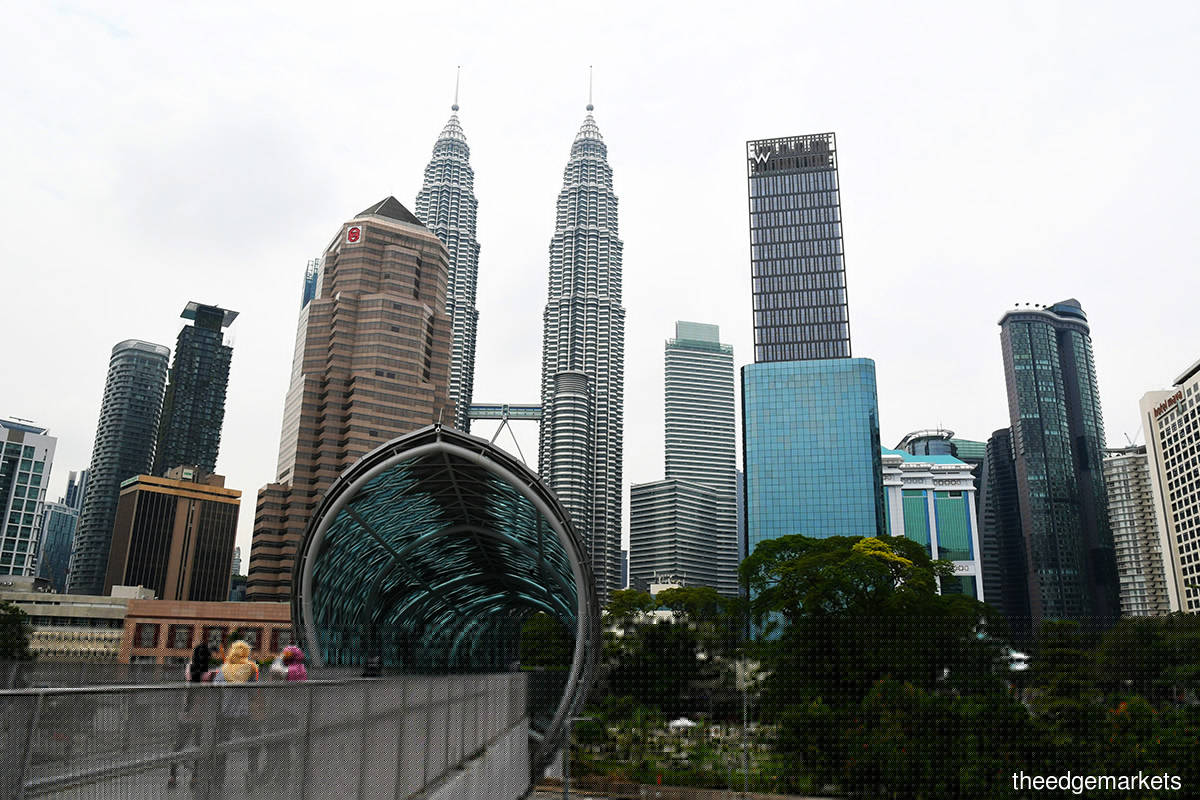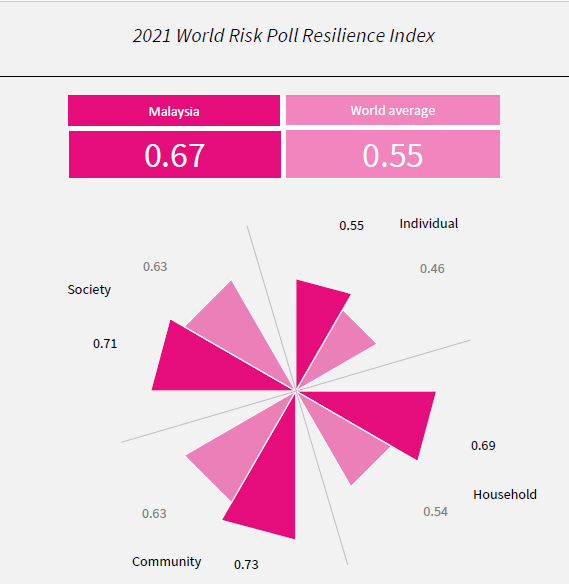Malaysia shows greater resilience on World Risk Poll data
 Malaysia showed greater resilience and fared better than the world average in the Lloyd’s Register (LR) Foundation 2021 World Risk Poll data based on a survey by pollster Gallup Inc.
Malaysia showed greater resilience and fared better than the world average in the Lloyd’s Register (LR) Foundation 2021 World Risk Poll data based on a survey by pollster Gallup Inc.
根据民意调查机构Gallup公司的一项调查,马来西亚表现出更强的韧性,并且表现优于劳氏 (LR) 基金会 2021 年世界风险民意调查数据的世界平均水平。
Malaysia had a score of 0.67 versus the world average of 0.55.
马来西亚的得分为 0.67,而世界平均得分为 0.55。
Gallup collected data on safety and risk from over 125,000 people in 121 countries.
Gallup收集了来自 121 个国家的 125,000 多人的安全和风险数据。
By understanding how prepared and resilient individuals believe their communities, countries, and institutions are in dealing with disasters, LR shares insight with governments, development agencies, businesses, and researchers to help them identify vulnerabilities and take action to make people safer.
通过了解有准备和有复原力的个人如何相信他们的社区、国家和机构在应对灾害时,LR 与政府、发展机构、企业和研究人员分享见解,以帮助他们识别漏洞并采取行动让人们更安全。
The Resilience Index score is between 0 and 1, with a higher score indicating greater resilience.
弹性指数分数介于 0 和 1 之间,分数越高表明弹性越大。
The overall score is calculated from scores in four areas:
总分是根据四个方面的分数计算得出的:
- 'Individual' resilience is the average of two survey items which measure agency/self-efficacy and educational attainment.
- “个人”复原力是衡量机构/自我效能和教育程度的两个调查项目的平均值。
- 'Household' resilience is the average of three metrics: one measuring financial assets, one measuring planning and one is the average of two survey items that measure access to communications.
- “家庭”弹性是三个指标的平均值:一个衡量金融资产,一个衡量计划,一个是衡量通信访问的两个调查项目的平均值。
- 'Community' resilience is the average of two metrics: social capital and local infrastructure. These two metrics are each created from the average of three survey items.
- “社区”弹性是两个指标的平均值:社会资本和当地基础设施。这两个指标都是根据三个调查项目的平均值创建的。
- 'Society' resilience is the average of three metrics: discrimination (scored from five survey items), government caring about well-being (one item), and a four-item index of confidence in national institutions.
- “社会”弹性是三个指标的平均值:歧视(从五个调查项目中得分)、政府关心福祉(一个项目)和对国家机构的四个项目信心指数。

In terms of the last disaster they experienced, 97% of Malaysians polled said they face flood/heavy rain.
就他们经历的最后一场灾难而言,97% 的接受调查的马来西亚人表示他们面临洪水/大雨。
Some 23% said they had gone without electricity for more than a day, 20% said they been without clean drinking water for more than a day, 6% said they had been unable to obtain food due to shortages for more than a day, 5% said they had been unable to obtain medical assistance or medicine for more than a day, while 14% said they had been unable to access a telephone for more than a day.
约 23% 的人表示他们已经超过一天没有电,20% 的人表示他们已经超过一天没有干净的饮用水,6% 的人表示他们因为短缺而无法获得食物超过一天,5 % 的人表示他们已经超过一天无法获得医疗救助或药物,而 14% 的人表示他们已经超过一天无法使用电话。
Discrimination 歧视
Of important note, Malaysians in general faced less discrimination on a global scale. Only 8% said they were discriminated due to skin colour versus 10% globally, 7% discriminated on religion against 12% globally, 8% based on race versus 12% globally, 6% due to gender against 11% globally, and 3% due to disability versus 6% globally.
值得注意的是,马来西亚人在全球范围内普遍面临的歧视较少。只有 8% 的人表示他们因肤色而受到歧视,而全球为 10%,7% 因宗教而受到歧视,全球为 12%,8% 基于种族,全球为 12%,6% 因性别而全球为 11%,3% 因残疾,而全球为 6%。
On how much they think the government cares about them and their well-being, a whopping 35% said the government cares a lot while 16% said not at all.
关于他们认为政府关心他们和他们的福祉的程度,高达 35% 的人表示政府非常关心,而 16% 的人表示根本不关心。
